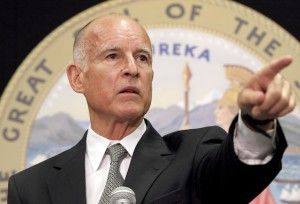Minimum-wage law’s opt-out provision unlikely to be used by governor
 A California governor is asked to sign historic, far-reaching legislation that could have unknown consequences — and tells the Legislature he will only go along if there is an escape clause that can be used if the law causes economic mayhem.
A California governor is asked to sign historic, far-reaching legislation that could have unknown consequences — and tells the Legislature he will only go along if there is an escape clause that can be used if the law causes economic mayhem.
That’s what happened in 2006 when Arnold Schwarzenegger worked with legislative leaders to shape Assembly Bill 32, the landmark law forcing a shift to cleaner, costlier sources of energy. And it’s what happened in the last month with Jerry Brown and the bill increasing the state’s minimum wage steadily until it reaches $15 an hour in 2022, which Brown signed Monday. A provision that allows future governors to suspend an increase in bad economic times was included at Brown’s insistence:
Brown had warned a $15-an-hour wage must be done carefully, noting costs to employers and the state. But with a measure heading for the November ballot, he negotiated with unions and other advocates to include provisions that allow governors to postpone an increase if the economy falters.
Those provisions would allow governors to suspend annual wage increases short of $15 if officials project that the state’s budget reserves will be in the red, or if employment and sales tax revenue decline. Governors would need to decide each September whether to suspend increases coming the following January.
That’s from the Sacramento Bee.
AB32’s escape hatch was never used
But will this escape hatch ever be used? The history of AB32 suggests not. Schwarzenegger was adamant that there must be a way that the law could be suspended, as the Los Angeles Times reported in an Aug. 31, 2006, story about negotiations over the law:
For his part, Schwarzenegger won the ability for the governor to suspend the rules for as much as a year in cases of “extraordinary circumstances, catastrophic events or threat of significant economic harm.”
But in the years that followed, California had among its roughest economic stretches since the Depression. Unemployment, which averaged 4.9 percent in 2006, went to 5.3 percent in 2007, 7.2 percent in 2008, 11.3 percent in 2009 and 12.4 percent in 2010. Fewer Californians had jobs in 2010 than in 2000 — even as the state’s population went from 33.9 million to 37.3 million.
Business interests who said higher energy costs put California at a competitive disadvantage implored Schwarzenegger to suspend AB32. They eventually backed Proposition 23, a 2010 ballot measure that sought but failed to suspend the landmark law on greenhouse gases.
Not only did Schwarzenegger reject the idea that AB32 had an economic downside, he promoted the idea that it would create hundreds of thousands of jobs and touted the claim that California would inspire the world to adopt similar laws. Republican critics said he was more concerned about his legacy than Californians struggling in the recession.
If Brown invokes the clause that suspends the law steadily increasing the minimum wage in coming years, that too would muddy his legacy as the governor of the first U.S. state to have a $15 minimum wage law. If the person who succeeds him as governor in January 2019 suspends the law, that also would muddy California’s image as a bold, progressive state going places no state has gone before.
Chris Reed
Chris Reed is a regular contributor to Cal Watchdog. Reed is an editorial writer for U-T San Diego. Before joining the U-T in July 2005, he was the opinion-page columns editor and wrote the featured weekly Unspin column for The Orange County Register. Reed was on the national board of the Association of Opinion Page Editors from 2003-2005. From 2000 to 2005, Reed made more than 100 appearances as a featured news analyst on Los Angeles-area National Public Radio affiliate KPCC-FM. From 1990 to 1998, Reed was an editor, metro columnist and film critic at the Inland Valley Daily Bulletin in Ontario. Reed has a political science degree from the University of Hawaii (Hilo campus), where he edited the student newspaper, the Vulcan News, his senior year. He is on Twitter: @chrisreed99.
Related Articles
Mitch Albom, CWD contributor talk about Silicon Valley, diversity
Jesse Jackson’s on-again, off-again campaign against Silicon Valley for the lack of blacks, Latinos and women in its tech workforce
Maviglio wrong on tax increase aftermath
Aug. 15, 2012 By John Seiler I like Steve Maviglio, the longtime Democratic and union activist and spokesperson, because he
Voluntary Tax Contributions Coming
Katy Grimes: For anyone interested in voluntarily paying more in taxes to the state of California, one California Senator wants to



